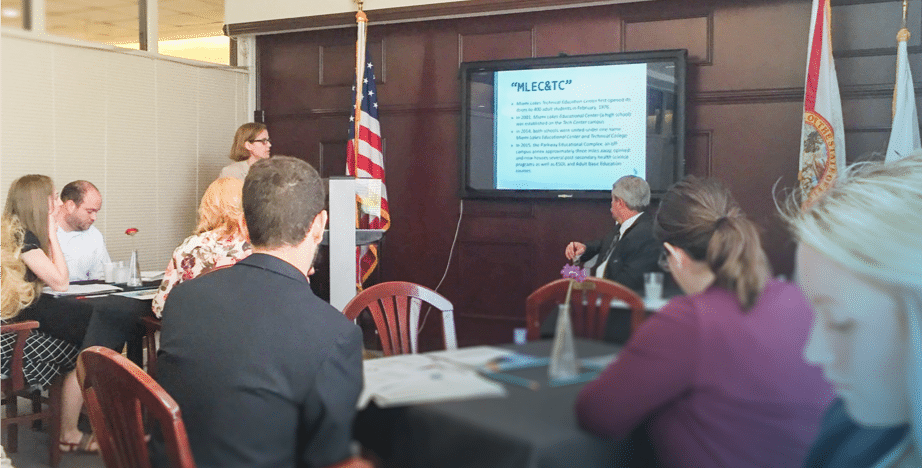Overview
Without the support of the community, public educational institutions do not receive the funding that they need to remain vibrant learning centers for students. Sharing this basic assumption, the presenters of this forum addressed the nuts and bolts of organizing community-school partnerships. Wendy Puriefoy, president of the Public Education Network (PEN), discussed her organization’s national effort to foster community support for public education. M. Anthony Habit, president of the Wake Education Partnership in Raleigh, North Carolina, and Sonia Louden-Walker, former executive director of Partners in Public Education in Memphis, Tennessee, provided local perspectives.
Forum Brief
Wendy Puriefoy began with a discussion of her personal experience in community activism for public education and the national role of PEN in the 1980s and ‘90s. Puriefoy started her education career in Boston during the contentious era of court-ordered desegregation. She asked herself, “Why are these children on the bus, and what are they getting at the end of the ride?” The most important answer, in her mind, was that at the end of their daily bus ride, car trip, or walk to school, students deserve a quality educational experience. As the president of the Public Education Network, Puriefoy has organized support across the country for just such quality educational experiences.
Established in 1991 as part of the Ford Foundation’s Pubic Education Fund initiative, PEN aims to improve public education for low-income and minority children, primarily in urban centers. One of the ways that PEN does this is through collaboration with Local Education Funds (LEFs). LEFs are made up of schoolteachers, administrators, business leaders, parents, and other community activists deeply interested in public education. They are non-partisan advocates for public education and high student achievement. PEN coordinated efforts by LEFs over the last few years to raise money in 19 cities for new construction and improvements of library facilities. With PEN’s help, the LEFs raised a total of $60 million and are helping to raise the level of investment in our public schools.
Tony Habit, president of the Wake Education Partnership in Raleigh, North Carolina, says that his district needs the support of a Local Education Fund for an entirely different reason. With the Research Triangle Park and other area companies booming, demand for new labor has spurred massive immigration into Wake County. This, in turn, has placed a strain on a rapidly growing school system. Over the course of the 1990s, the Wake school district gained 50,000 new students. Wake has an excellent school system, with high average SAT scores, but Habit worries that some students are left out of this high achievement. He reports that between 50 and 60 percent of the African American students on free or reduced price lunch do not achieve at grade level. Along with disparate achievement levels, Habit also fears that multiple funding streams attached to specific programs in the Wake schools have led to what he calls “mission drift.” This occurs when funding streams pull program directors and school reformers in divergent directions, so that they work at cross-purposes.
At the Wake Education Partnership (WEP), Habit and others try to engage the community in support of systematic school reforms that integrate various programs and funding streams into a coherent plan of school improvement. WEP conducts surveys to determine the educational expectations and reforms desired by the community, and at their Annual Education Summit, WEP allows community members opportunities to “hash out” ideas about school reform in a public forum. At the last Summit, community members drafted an educational goal for Wake County. By 2003, they will supply the resources needed to get 95 percent of 3rd and 8th graders achieving at or above grade level. WEP and, more importantly, the communities in Wake County can now focus fund raising efforts and school reforms to meet this ambitious goal.
In Memphis, the LEF is called the Partnership in Public Education (PIPE). Sonia Louden-Walker founded PIPE in 1993 with a budget of $300,000 and she left her position last year after coordinating a three-year fund raising drive that garnered $5 million in support for the Memphis schools. PIPE raised this money with four specific goals in mind: 1) establish a teaching and learning academy; 2) establish scholarships for principals to attend a professional development program at Harvard University; 3) expand the teacher initiative grant program; and 4) support the New American Schools initiatives underway in Memphis. According to Louden-Walker, PIPE was successful, in part, due to the help of the city’s dynamic school superintendent, Gerri House. House is leaving this year to take a job in New York, but Louden-Walker is confident that the partnership between the Memphis schools and the community established by the PIPE will help smooth the transition for the new superintendent.
In Memphis, Raleigh, and cities across the country, there is growing community support for the public schools. PEN and the local LEFs are fostering these relationships, without getting in the way of local leadership. All of the presenters reiterated the importance of letting community members decide which reforms and fundraising efforts best fit their local school systems. In their own low-key but formidable way, they are doing much of the grassroots work necessary to ensure that public schools have the supports they need to thrive in the new millennium.
This information is from an American Youth Policy Forum held on March 3, 2000 at the Barnard Auditorium of the U.S. Department of Education, reported by Steve Estes.
Presenter Information
M. Anthony Habit
President
706 Hillsborough Street, Suite A
Raleigh, NC 27603
(919)-821-7609
Sonia Louden-Walker
Former Executive Director
Partners in Public Education
5050 Cole Road
Memphis, TN 38817
Wendy Puriefoy
President
601 13th Street, NW
Suite 900 North
Washington, DC 20005
202-628-7460
Jane Walters
President
Partnership in Public Education
4646 Poplar Street, Suite 535
Memphis, TN 38117
(901)-682-8100


